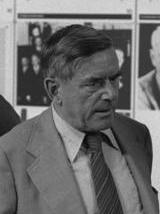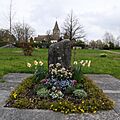Golo Mann facts for kids
Quick facts for kids
Golo Mann
|
|
|---|---|
 |
|
| Born |
Angelus Gottfried Thomas Mann
27 March 1909 Munich, Kingdom of Bavaria, German Empire
|
| Died | 7 April 1994 (aged 85) Leverkusen, North Rhine-Westphalia, Germany
|
| Nationality | German, Swiss |
| Alma mater | University of Freiburg |
| Known for | German History in the 19th and 20th Century (1958); Wallenstein; sein Leben erzählt (1971); Erinnerungen und Gedanken. Eine Jugend in Deutschland (1986) |
| Parents |
|
| Scientific career | |
| Fields | Historian |
| Institutions | Claremont Men's College, California; University of Stuttgart |
Golo Mann (born Angelus Gottfried Thomas Mann; 27 March 1909 – 7 April 1994) was a famous German historian and essayist. He was known for writing about German history. Golo Mann was the son of the well-known writer Thomas Mann.
After finishing his studies, Golo Mann had to leave Germany in 1933 because of Adolf Hitler. He followed his family to France, Switzerland, and the United States. Later in his life, he returned to Switzerland and West Germany. He became a respected historian of literature and history. His most famous book was German History in the 19th and 20th Century, published in 1958.
Contents
Early Life and School
Golo Mann was born in Munich, Germany. His mother, Katia Pringsheim, came from a family of a famous mathematician and an actress. His father, Thomas Mann, was a well-known writer. Golo was a nickname he used as a child, and it stuck.
He had five siblings. His older siblings were Erika Mann and Klaus Mann. His younger siblings were Monika, Elisabeth, and Michael. His mother described him as a sensitive child. Golo felt closest to his brother Klaus.
Golo Mann went to a classical school in Munich. He was good at history and Latin. He also loved reciting poems. As a teenager, he joined a nationalist youth group. But his family taught him about tolerance and peace, especially between France and Germany. He later supported the idea of a united Europe.
In 1923, Golo went to Schule Schloss Salem, a special boarding school. He enjoyed the new way of learning there and loved hiking. However, in 1925, he went through a difficult time. He felt a deep sadness that stayed with him.
University Studies and Leaving Germany
After school, Golo Mann studied law in Munich. He then moved to Berlin to study history and philosophy. In 1928, he learned French in Paris. He also tried working in a coal mine for a short time.
In 1929, he went to the University of Heidelberg. He studied philosophy and history. He also joined a student group that supported the Social Democratic Party of Germany. In 1932, he finished his main university paper.
In January 1933, Adolf Hitler became the leader of Germany. Golo Mann's parents, who did not like Hitler's ideas, moved to Switzerland. Golo helped his younger siblings leave the country. He also helped his parents move their savings to Switzerland. On May 31, 1933, Golo Mann left Germany for France.
Life in Exile
Golo Mann spent time in France and Switzerland. He worked as a lecturer, teaching German language. He also wrote for a magazine created by Germans who had left their home country. In 1936, Golo and his family lost their German citizenship. He later gained citizenship from Czechoslovakia.
In 1939, Golo Mann visited his father in Princeton, New Jersey, in the United States. His father was a guest professor there. Even though war was coming, Golo returned to Switzerland to work for a magazine.
When World War II began in 1940, Golo Mann decided to join a Czech military group in France. He was arrested and sent to a French camp for a short time. He was later released and made a brave escape across the Pyrenees mountains to Spain. From there, he sailed to New York City.
In the United States, Golo Mann lived with his parents for a while. He later taught history at Olivet College in Michigan. He then joined the US Army. He worked as an intelligence officer, collecting and translating important information.
In 1944, he was sent to London. He made radio broadcasts in German for an American station. During the last months of the war, he worked for a military propaganda station. After the war, he helped start Radio Frankfurt in Germany. He was shocked by how much Germany had been destroyed by bombing.
In 1946, Golo Mann left the US Army. He worked as a civil control officer, watching the Nuremberg Trials, where war crimes were judged. That same year, he published his first important book, a biography of a 19th-century diplomat.
In 1947, Golo Mann became a history professor in California. He later said these nine years were "the happiest of my life."
Returning to Europe
In 1956 and 1957, Golo Mann spent many weeks writing his book German History of the 19th and 20th century. It was published in 1958 and quickly became a bestseller. This book marked his full return to Europe. He became a guest professor at the University of Münster in Germany.
In 1960, Mann became a professor of Political Science at the University of Stuttgart. However, he felt unhappy with how universities worked. He resigned from his professorship in 1963.
After that, Golo Mann worked as a freelance historian and essayist. He lived in Kilchberg, Switzerland, with his mother for many years. He often worked too much, which affected his health.
One of his most successful historical studies was a large biography of Albrecht von Wallenstein, published in 1971. Wallenstein was a famous military leader during the Thirty Years' War. Golo Mann had been fascinated by him since childhood. The LA Times newspaper called his Wallenstein book "a work not only of learning but of art."
Political Views
Golo Mann was asked in 1965 why he didn't join extreme political groups like many others in his generation. He said it was because of his way of thinking and his personality. He always disliked leaders who were too strict or believed they had all the answers.
Mann described his own views as generally conservative. This meant he believed in the importance of traditions and stable communities. He thought that people are not always perfectly good or reasonable. He felt that old traditions, even if they seemed a bit old-fashioned, could help people feel connected and have a sense of belonging. He believed he could still vote for the Social Democratic Party, even with his conservative ideas.
In the early years of West Germany, Golo Mann praised Konrad Adenauer, the first Chancellor. Adenauer worked to make peace with France and become allies with the United States. Later, Mann supported Willy Brandt's Ostpolitik. This policy aimed to improve relations with Eastern European countries and accept the post-war borders. Mann saw this as a realistic and "conservative" approach.
Mann was cautious about the student movements of the 1960s. He also criticized Brandt for not being tough enough on certain issues. He called the actions of terrorist groups "a new kind of civil war."
In 1979, Golo Mann surprised many people by supporting Franz-Josef Strauß, a right-wing politician. Mann explained his choice by saying he was worried about the future of the economy and the need for stronger policies.
Views on German History
Golo Mann believed that Adolf Hitler and the Nazi era were often avoided as a topic in Germany. But once it was discussed, he felt that some historians went too far. He disagreed with the idea that Hitlerism was an unavoidable part of German history. He also didn't like it when people tried to make the Holocaust seem "normal" by comparing it to other terrible events.
Mann strongly believed that the Holocaust was a unique and terrible crime. He said that there was nothing that made Hitlerism bound to happen. The Weimar Republic did not have to fall, and the Jews of Europe did not have to die. He wrote that thinking such a catastrophe was "foreseeable" gave it a meaning it didn't have. He thought that history often has more unexpected, unreasonable, and senseless events than we like to admit.
He was against any attempts to compare the Holocaust with other events like Stalinism or Allied bombing during the war. He called the Holocaust "the vilest crime ever committed by man against man."
Later Years
In 1986, Golo Mann's adopted son, Hans Beck-Mann, passed away. Golo Mann had known him since 1955 and helped him with his studies. In November of that year, Golo Mann published his successful autobiography, Memories and Thoughts. A Youth in Germany. He started working on a second part, but he never finished it. In 1988, he received an honorary degree from the University of Bath.
After his adopted son's death, Golo Mann lived a quiet life in Berzona, Switzerland. He spent his time translating books by a Spanish novelist named Pío Baroja.
In 1989, the East German government allowed his book Wallenstein to be sold there. He was even invited to read from it. When Germany was reunited in 1990, Golo Mann reacted calmly. He said he wasn't overly excited, believing that things might still go wrong, even if he wouldn't live to see it.
In March 1990, Golo Mann had a heart attack. He was also diagnosed with prostate cancer. Because of his health, he moved to Leverkusen in 1992. He was cared for by Ingrid Beck-Mann, his adopted son's widow.
Golo Mann passed away on April 7, 1994, at the age of 85. His ashes were buried in Kilchberg, Switzerland. His grave is separate from his family's grave, as he wished.
Golo Mann's writings and papers are kept in the Swiss Literary Archives in Bern. In 2009, Germany honored his 100th birthday with a special stamp. It showed his picture and called him a "literary historian."
Works
- 1947 Friedrich von Gentz
- 1958 Deutsche Geschichte des 19. und 20. Jahrhunderts (German History of the 19th and 20th Century)
- 1964 Wilhelm II
- 1970 Von Weimar nach Bonn. Fünfzig Jahre deutsche Republik (From Weimar to Bonn. Fifty Years of the German Republic)
- 1971 Wallenstein
- 1986 Erinnerungen und Gedanken. Eine Jugend in Deutschland (Memories and Thoughts. A Youth in Germany)
- 1989 Wir alle sind, was wir gelesen (We Are All What We Have Read)
- 1992 Wissen und Trauer (Knowledge and Sadness)
- 2009 Man muss über sich selbst schreiben. Erzählungen, Familienporträts, Essays. Herausgegeben vn Tilmann Lahme. Frankfurt am Main: S. Fischer Verlag. (One Must Write About Oneself. Stories, Family Portraits, Essays)
Images for kids
See also
 In Spanish: Golo Mann para niños
In Spanish: Golo Mann para niños
- Dohm–Mann family tree
 | Kyle Baker |
 | Joseph Yoakum |
 | Laura Wheeler Waring |
 | Henry Ossawa Tanner |


